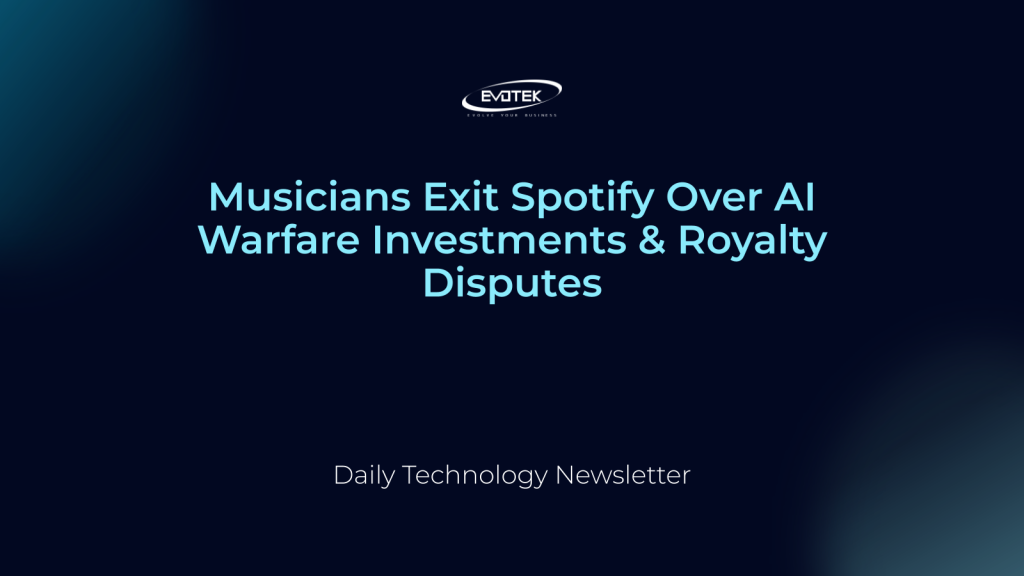A growing chorus of artists is making a powerful statement by pulling their music from Spotify, triggering a significant debate within the global music industry. The recent exodus, which includes prominent acts like Canadian post-punk band Godspeed You! Black Emperor, American outfits Deerhoof and Xiu Xiu, and Australian contemporary musician David Bridie, stems from a complex mix of long-standing grievances and a new, deeply concerning ethical issue: Spotify CEO Daniel Ek’s substantial investment in AI-driven weapons technology.
While low artist compensation and the pervasive rise of AI-generated music have fueled discontent for years, the immediate catalyst for this latest boycott is Ek’s 600 million euro investment, made through his investment fund Prima Materia, into Helsing. This Munich-based defense tech startup specializes in real-time AI warfare and armed interventions. The revelation of this investment, amidst heightened geopolitical instability from conflicts like the Russia-Ukraine war and the Israel-Palestine conflict, has ignited widespread moral outrage among the artistic community. Ek, who also chairs Helsing, has defended the venture, stating it will ensure “strategic autonomy” and “security readiness” for Europe.
However, many artists view this as an unacceptable entanglement of their creative work with military endeavors. Xiu Xiu famously branded Spotify a “garbage hole armageddon portal,” while members of Deerhoof declared, “We don’t want our music killing people. We don’t want our success being tied to AI battle tech.” The Kalahari Oyster Cult Label echoed these sentiments, refusing to let their music contribute to a platform “led by someone backing tools of war, surveillance, and violence.” David Bridie articulated the core dilemma: artists inadvertently helping to build algorithms that ultimately generate wealth for a man investing in “machines that could kill people.” He highlighted the devastating impact of AI drone wars and slammed Spotify as no longer merely a “necessary evil,” but simply “evil” by association.
Beyond the ethical quandary of AI warfare, the perennial issue of paltry artist compensation remains a sore point. Artists frequently cite the “insulting and completely unsustainable” payouts from streaming services, often ranging between a meager $0.003 and $0.005 per stream. This, coupled with the increasing dominance of streaming platforms and the challenge posed by AI-generated tracks, exacerbates the financial struggles faced by many musicians.
This isn’t the first time artists have challenged Spotify. In 2022, rock legend Neil Young and singer-songwriter Joni Mitchell famously removed their music over concerns about podcaster Joe Rogan spreading COVID-19 misinformation. While they later returned, citing the platform’s expanding reach, the incident underscored the immense power wielded by streaming giants. Similarly, Radiohead’s Thom Yorke and pop icon Taylor Swift previously pulled their catalogs in 2014 and 2017, respectively, advocating for fairer artist royalties and proper valuation of music as art. Swift, too, eventually returned after an reported increase in industry payments.
Spotify has attempted to address some of these concerns over the years. It upgraded its royalty system in 2017 and launched the ‘Loud and Clear’ initiative in 2021 for greater financial transparency, emphasizing that payments go to labels and aggregators, not directly to artists – a key demand for many musicians. The platform has also implemented rules to combat system abuse, such as requiring a minimum of 1,000 plays for royalties and increasing the minimum track length to two minutes for eligibility, aiming to deter short ‘noise’ tracks designed solely to generate revenue. Recently, Spotify has also claimed to be actively working on detecting AI-made music.
However, the company has conspicuously remained silent on the current controversy surrounding CEO Daniel Ek’s AI warfare investments. This silence only widens the chasm between artistic values and the strategic maneuvers of one of the world’s largest music streaming platforms. As Ek himself stated to The Financial Times, “Personally, I’m not concerned about it. I focus more on doing what I think is right and I am 100 per cent convinced that this is the right thing for Europe.” This stark difference in perspective highlights an ongoing struggle for ethical integrity and fair compensation that continues to redefine the relationship between artists and the digital platforms that host their work.

 日本語
日本語 한국어
한국어 Tiếng Việt
Tiếng Việt 简体中文
简体中文